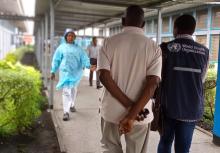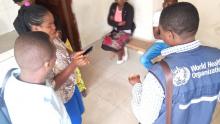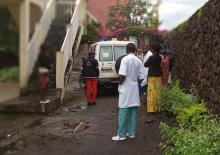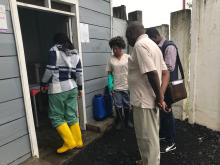Winning the hearts of communities fearful of Ebola
Goma, Democratic Republic of the Congo, 24 June 2019 – “You can’t take my son away because I know you will go kill him. You will inject him with Ebola. That’s what everybody here knows.”
This response from an angry father, faced with the possibility that his son would be moved from a local hospital to an Ebola Treatment Centre, reflects the reality of containing an epidemic in an area where folklore, rumour and suspicion of outsiders abound.
For Dr. Ramses Kalumbi, Surveillance Team Leader for the World Health Organization (WHO) in Goma, reassuring his patients and their families is all in a day’s work. Empathy, patience and compassion are a vital part of the treatment offered by his team of doctors, psychologists and health workers.
The Ebola-affected city of Butembo, where the 27-year-old man has been working as a driver, is 350km away – an eight-hour journey by road. He had returned home to visit his family when he started to feel unwell.
Initial symptoms indicated malaria but his high fever and diarrhoea have rung alarm bells, and now he is terrified. So far, the tiered system of surveillance set up by the government and WHO have kept the disease out of Goma, but nobody can afford to take any chances.
His case came to the attention of a surveillance team combing health facilities and neighbourhoods to identify patients with symptoms that might indicate Ebola infection.
Such cases are quickly sent to the alert centre which deploys investigators to assess the patient and decide whether to authorise a transfer to the nearest Ebola Treatment Centre for blood tests. If the test returns positive, the patient is isolated for treatment and if negative the patient is returned to the initial health facility or to their family to continue previous treatment.
Coupled with distrust of health workers is a belief among many people in Goma that Ebola does not exist.
“They do not have family members in the regions affected by the disease. They are people who have not travelled to see the devastation,” says Bahati Sabimana Faustin, a traditional healer who works in the Bujavu area of Goma.
Support from traditional healers like Faustin who have had training in how to recognise Ebola symptoms play an important role in containing the disease and in encouraging the community to take precautions.
“If a patient comes to me with high temperature, vomiting, diarrhoea or bleeding, I receive them, put them in a separate room and contact the alert centre for further investigation,” Faustin explains. So far he has referred two patients but both were found not to be suffering from Ebola.
“There are many people who do not believe Ebola is real but after getting the right information, they often change their minds. I tell them that Ebola exists. I am certain it is there. Ebola is real,” he says.
Back in the primary health facility, Dr Kalumbi and a psychologist from the ministry are engaging with the family in an attempt to reassure them that their son will be safe.
“Look at me baba. Look at me. I am one of you,” Dr Kalumbi says, looking in the eyes of the angry father. “I will take care of your son. My promise to you is that no one will hurt him.”
“Look at my son, he is healthy except that he has malaria,” the father replied. “I hear all the time that you take healthy people like him and inject them with Ebola. My son will not leave this hospital. You can take his blood and do the test but you will not take him away.”
The conversation between the father and Dr. Kalumbi went back and forth, with each fear and rumour being met with calm responses from the medical team. Gradually the tension subsided.
“We care about your son and that is why we will take him to the treatment centre,” Dr Kalumbi says. “It will be a protection for him and all of you, if he truly has Ebola.”
Moments later the father agreed, on condition that he could accompany his son as the Ebola tests were administered.
As they arrived at the centre, Dr. Kalumbi received a phone call. It was from the young man’s mother who pleaded with him: “Please do not inject my son with Ebola. His life is in your hands.”
She was met with the same calm, reassuring response that no one injects patients with Ebola, it is just a disease that needs to be attended to immediately.
In this case the results were good. The young man was Ebola free and was returned to his family.
As importantly, the trust that was built up between Dr. Kalumbi and the family chips away at the fears and the disinformation that he and hundreds of his colleagues face as they hit the streets again tomorrow and the following days – scouting, screening patients, tracking and engaging communities in order to stop the spread of the Ebola Virus inside the rest of the country and beyond.
“Nothing terrifies families like the isolation of one of their own for Ebola treatment,” Dr. Kalumbi says. “They fear that they will never return. There is only one way to win their trust and that is through an honest discussion and empathy.”







